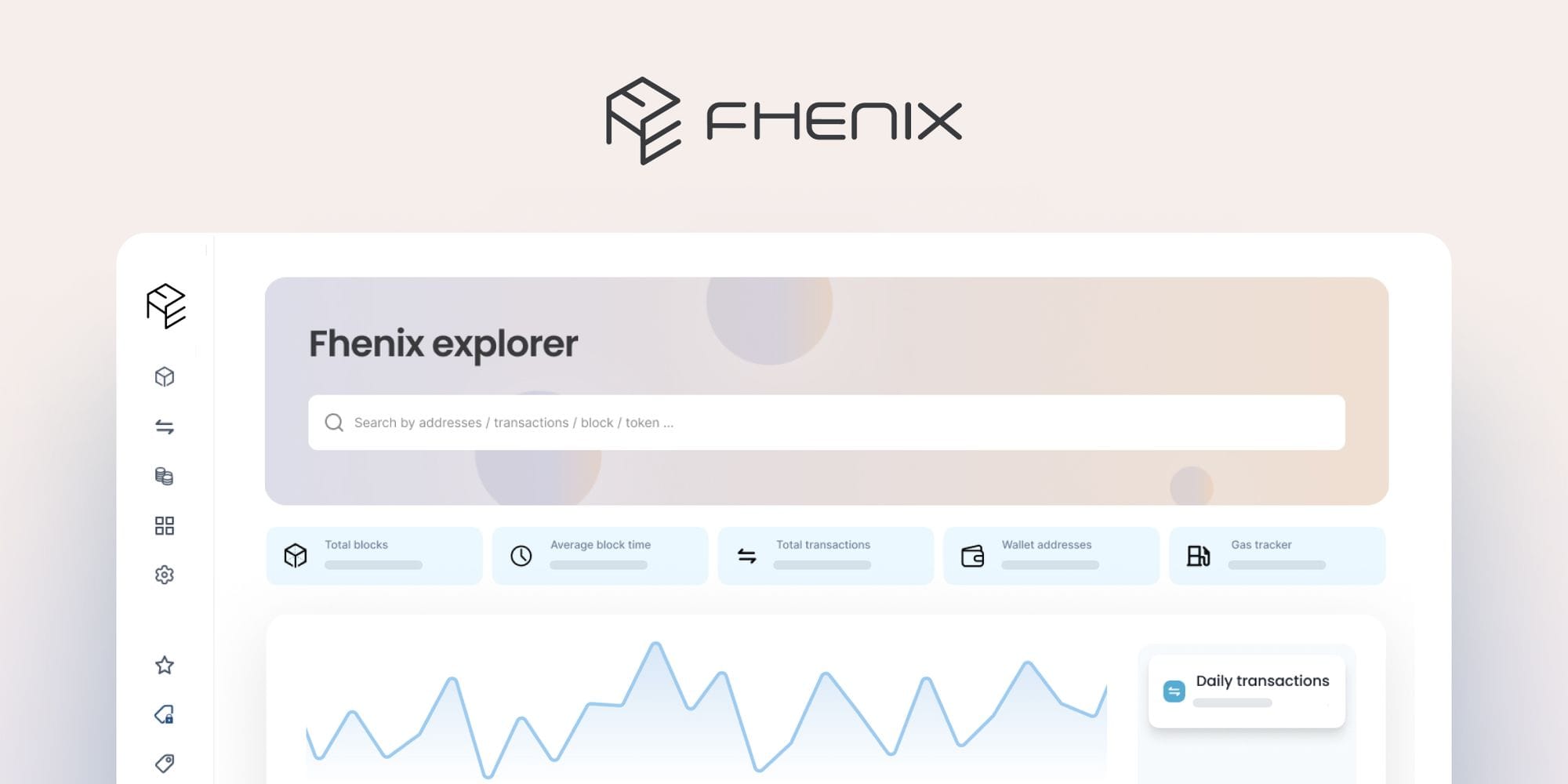Fhenix chooses Blockscout to support encrypted transactions
We had a recent opportunity to talk with Fhenix about their new chain and how they are using Blockscout to support private, encrypted transactions.

We met the Fhenix team at EthDenver and were intrigued by their privacy technology and a new flavor of rollup they are developing called an FHE (Fully Homomorphic Encryption) Rollup. This L2 is built using an Arbitrum-based Optimistic rollup as a starting point, and then incorporates encryption technology to enable confidential smart-contract interactions. The Fhenix team currently runs their own Blockscout testnet instance.
Hi guys! We’re excited about what you are developing at Fhenix, and wanted to learn more about Fully Homomorphic Encryption. Can you break this down a little bit, what it means and how it works with your rollup. Is it similar to zk technology which can also be used for privacy, or is it something totally different?
ZK and FHE are both privacy-enabling technologies, but crucially, FHE enables blind data processing. With FHE, encrypted data can be stored, transmitted, and computed on without ever being decrypted–in other words: full end-to-end encryption.
Meanwhile, ZK techniques are better suited to verifying the result of computations, rather than enabling the computation of encrypted data itself.
It seems there are a lot of cool use cases for this type of chain, from trustless gaming to onchain voting. What apps have you seen that are interesting, and how do you envision people and projects using Fhenix?
Full end-to-end encryption onchain opens up a whole new application design space. Interesting use-cases include confidential voting, blind auctions, onchain games, private transfers, social networks, and likely many more that have yet to be thought of or explored.
The value and utility of bringing privacy and confidential computation to the blockchain is hard to overstate.
Every chain needs an explorer, and we are glad you found the Blockscout open-source version to roll out for your testnet. First we wanted to ask why you chose Blockscout, and also about your experience with deployment, was it easy to setup and deploy or did you have any issues?
We initially chose Blockscout (at the time it was on v4) since it was the best explorer that was open source with a good UI that worked out of the box. At the time deployment consisted of just setting up a single docker container, which was a great way to help us get started while we continue to build out the chain. We’ve since migrated to v6, which is a more mature and complex solution. Working with the microsevices-based architecture was definitely more of a challenge than just fire-and-forget, but after a bit of tinkering we got the configuration properly tuned and working well.
Once you had your version running, what were some customizations you needed to make? Since some transaction data is encrypted and private, did you need to change fields or views or make other accommodations to display your data?
One of the things we really liked about Blockscout is that it didn’t require a lot of customization. That being said, because execution of FHE operations is quite complex we had to tune down the aggressiveness of the backend’s historical transaction requests–this made for a good stress test for our nodes!
As for the display layer, we didn’t really change much beyond basic branding. Since the data is encrypted, there wasn’t much to do there. We were pleasantly surprised that even though encrypted ciphertexts are pretty large it displayed the information well out of the box.
We were also curious about how smart contracts work on the chain, and specifically about smart contract verification. With Blockscout, smart contract verification is a vital step for transparency and proving that a contract does what it says is so important for security and user trust. If smart contracts are encrypted on Fhenix how can users verify a contract?
Fhenix is designed to be compatible with the EVM ecosystem. The contracts themselves are written in Solidity and the code is stored in plaintext onchain. The only thing that is encrypted is the user's data, not the contract code. This means that verifying contracts is as simple as it is on any other EVM chain!
That’s great! Does your L2 currently work with an Ethereum testnet to settle to L1, or is that upcoming? In general what’s next for Fhenix in the short term and what are some of your longer term plans?
The goal of Fhenix is to allow developers to experience what it’s like creating applications that utilize FHE and begin to grow our ecosystem. With Testnet (coming soon 👀) we’ll start taking the architecture to the next level, which will include settling on Ethereum Sepolia. We’re very excited to see what developers will build with the addition of bridging and cross-chain messaging.
Your docs have some great examples about how to get started using Fhenix, can you point readers to what you’d recommend for someone who is familiar with Solidity but wanting to experiment in an FHE environment?
This getting started guide has everything you need to deploy your first contract, starting with selecting your preferred development environment. We also have video tutorials for both the Remix and Hardhat plugins.
Thanks so much, we look forward to seeing how the Fhenix ecosystem develops and are excited you are using Blockscout to help support your developers!
About Fhenix
Fhenix extends Ethereum’s capabilities with Fully Homomorphic Encryption (FHE), a cutting edge encryption technology which enables computation of encrypted data. By facilitating the deployment of fully end-to-end encrypted applications, Fhenix unlocks a whole new design space for builders onchain.
About Blockscout
Blockscout is an open-source block explorer available for all EVM (Ethereum Virtual Machine) based chains. Live on nearly 1,000 networks, Blockscout features a robust interface for searching blocks, transactions, accounts, and tokens, and provides tooling for developers including APIs and smart contract verification. The new DAppscout marketplace built into Blockscout provides a secure environment for decentralized app discovery, exploration, and interaction.
